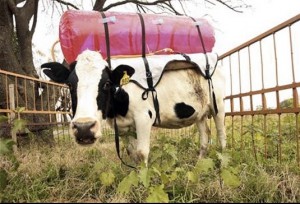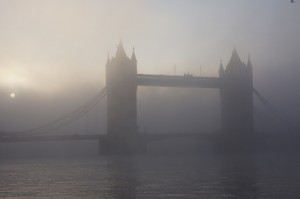In Paris, global action on climate change was taken (sort of), but what’s happening locally in Ireland and the United Kingdom?
What happened at the Paris climate talks was a necessary but insufficient step toward dealing with climate change.
One of the most helpful outcomes of the recently concluded global climate talks in Paris was the signal being sent to the business and investment world that the move to a low carbon, renewable energy economy is here to stay, and will intensify over the next several decades. That message will hopefully drive investment away from fossil fuels. Also at the Paris talks Bill Gates announced a multi-billion dollar Breakthrough Energy Coalition, with the participation of other philanthropic organisations, businesses, and governmental interests, for new research in five key areas: electricity generation and storage, transportation, industrial uses, agriculture, and projects that make energy systems more efficient. But see Samantha Page’s critique of the Gates project in the Commentary section of the current (Jan 2016) issue of irish environment.
Unfortunately these messages seem to have been lost in the mail by the governments in Ireland and the United Kingdom.
The government of Ireland is making a concerted effort to expand some renewable energies, and it recently published a White Paper setting forth its low-carbon energy policy for 2030-2050. The energy policy espouses some seemingly ambitious targets, which should send a signal to those still relying on fossil fuels that their time is coming to a close. Yet there is precious little in the White Paper that is concrete or even intimates how and where in the economy these targets will be met.
Meanwhile, the government continues, indeed reinforces, its commitment to a substantial growth in the agricultural sector that will result in significant increases in the release of methane into the atmosphere. Currently agriculture accounts for about 32% of Ireland’s greenhouse gas (GHG) emissions, much of it in the form of methane. Based on the government’s growth plan, agriculture emissions are projected to increase by 12% by 2020 on current levels.
So Ireland is indeed sending a clear signal to one of its largest industries — agriculture — about climate change. The message is: keep growing and polluting the atmosphere with the GHG methane and we’ll support you in any way we can, including by pleading with the EU for some exceptions to allow for this growth in GHG emissions. But the government fails to inform or engage the wider Irish public on which sector, or who, is going to cut GHG emissions in order to allow the agricultural sector to grow and pollute. Even the government’s energy White Paper on energy acknowledges that, “In the absence of emission reductions in agriculture, the large size of that sector in Ireland will lead to a greater share of the required adjustment falling to other non-ETS sectors (such as transport and heat).” At 33. Once again, though, there is no discussion of the size or scope of the burden that other sectors will have to bear in order that the agriculture sector can grow unimpeded.
Recently the Irish Minister for Agriculture stated that “Agriculture should not get a free pass when it comes to climate change,” but the government does not elucidate how the sector is going to pay its fair share of GHG emission reductions. It is quite clear that there will be no agreement by the government for any reduction in herd size. As the Minister stated, “Any fool can reduce emissions by simply producing less food…”. Instead the government usually rolls out alternatives like more research that will allow farmers to be more carbon efficient, even though the problem in Irish agriculture is methane, not carbon. There is also little evidence that the farming community will adopt, or can afford to pay for, such efficiency measures. Or the government hopes that the EU will provide some sort of exemption for Irish agriculture, even though the EU and others bailed out the Irish economy once already and even though the EU has complained for years about Ireland’s low business taxes. Or the government hopes that there will be some sort of massive forestry planting that will act as a carbon sink and be accepted by the EU in counting for carbon reductions. This despite the fact that Ireland has one of the lowest tree cover in the EU, at about 11% (up from 2% after several decades of plantings), while the average in the EU is about 30% tree cover. See Interview with Cillian Lohan in the Podcast section of the current (Jan 2016) issue of irish environment. If the carbon sink potential of trees is factored into a country’s carbon emission obligations, as an offset, everybody in the EU will benefit far more than Ireland. But hope seems to spring eternally in the hearts and minds of the Irish government.
Burp catching backpack, inhabitat.com
It can also be noted that last year Ireland planted about 7,000- 8,000 hectares of trees, while storms pulled down between 8,000 and 9,000 hectares of trees. The government’s claim that it intends to plant forest covering 43,000 hectares by 2020 is fanciful given the past history of the forestry sector and the fact that the government body responsible for planting forest, Coillte, a private company whose shares are owned by government Ministers, has gotten out of the business of planting new forests. See Lohan Interview.
The government also argues that its agriculture sector deserves special treatment because it can produce agriculture products with less carbon emissions than others in the EU. That position opens the door to other countries to argue that they can produce other products, perhaps IT and pharmaceutical products, with less GHG emissions than Ireland and therefore those businesses should move from Ireland to these other countries.
What is critically lacking is a full disclosure of the costs to the public as agriculture is allowed to grow at will.
Equally discouraging is the UK, which has gone from a beacon of light for climate change action to a dark dungeon. Likely as a way of a distraction from its regression on climate change action before the Paris global talks, the UK government announced recently that it will close all polluting coal-fired power stations by 2025 unless the stations capture their emissions presumably through a carbon capture and storage system (CCS).
At the same time, the UK government has cancelled its £1bn competition for carbon capture and storage (CCS) technology just six months before it was due to be awarded, breaking a pledge in the Conservative party’s election manifesto. It is eliminating support for onshore wind and solar power projects and blocking applications for these renewable energy projects through control over the planning system. It has also announced its plans to privatize the Green Investment Bank, the result of which is that the Bank is not obliged to invest in renewable and other green projects and could even invest in fracking. And it granted a £170 million subsidy to diesel farms.
Osborne cut spending on home energy efficiency by 83% on the same day that over 40,000 excess deaths were announced for the last winter. Another £700m – 40% – was cut from a scheme supporting green heating.
Under the Cameron/Osborne administration, the coal plants will be replaced by natural gas plants, less toxic than coal but still a polluting fossil fuel, and by nuclear plants. The natural gas likely is expected to be supplied by the government’s mad dash for fracking, in Northern Ireland as elsewhere in the UK. The nuclear plants are possible only through massive subsidies from the government, and in the case of Hinkley Point the subsidies benefit foreign state companies. One month of those subsidies for the Hinkley nuclear plant equal four years’ worth of subsidies for the entire solar sector. And when solar power projects fail they do not have the same effect on the planet as when nuclear power plants fail, as we have seen at the UK Sellafield plant, at Fukishima in Japan, not to mention at Chernobyl.
As for air quality, the Cameron/Osborne administration fiddles away in its dungeon while London and other large UK cities go up in smoke, particulate matter, and nitrogen oxides.
Sources
Clifford Krauss and Keith Bradsher, “Climate Deal Is Signal to Industry: The Era of Carbon Reduction Is Here,” The New York Times (14 Dec 2015). www.nytimes.com/2015/12/14/business/climate-accord-draws-mixed-reaction-from-business-leaders.html
Jackie Wattles, “Bill Gates launches multi-billion dollar clean energy fund,” CNN Money (30 Nov 2015). money.cnn.com/2015/11/29/news/economy/bill-gates-breakthrough-energy-coalition/
Irish EPA, Ireland’s Greenhouse Gas Emission Projections 2012-2030 (25 April 2013). www.epa.ie/pubs/reports/air/airemissions/epa_ghg_emission_proj_pub_2013_final.pdf
Department of Communications, Energy & Natural Resources, Ireland’s Transition to a Low Carbon Energy Future, 2015-2030 [Energy White Paper] www.dcenr.gov.ie/energy/SiteCollectionDocuments/Energy-Initiatives/Energy%20White%20Paper%20-%20Dec%202015.pdf
Paul Melia, “No ‘free pass’ for agriculture sector on emissions, warns Coveney,” Irish Independent (19 Nov 2015). www.independent.ie/irish-news/news/no-free-pass-for-agriculture-sector-on-emissions-warns-coveney-34214953.html
Damian Carrington, “UK cancels pioneering £1bn carbon capture and storage competition,” The Guardian (25 Nov 2015). www.theguardian.com/environment/2015/nov/25/uk-cancels-pioneering-1bn-carbon-capture-and-storage-competition
“Government moves to make UK first major country to end use of coal,” Belfast Telegraph (18 Nov 2015). www.belfasttelegraph.co.uk/news/uk/government-moves-to-make-uk-first-major-country-to-end-use-of-coal-34212648.html
“Ireland’s greenhouse gases fall – but not fast enough for EU,” Irish Independent (16 Dec 2015). www.independent.ie/irish-news/news/irelands-greenhouse-gases-fall-but-not-fast-enough-for-eu-34291522.html
Paul Melia, “Analysis: The future of Irish farming won’t be dictated by the Paris conference,” Irish Independent (16 Dec 2015). www.independent.ie/business/farming/analysis-the-future-of-irish-farming-wont-be-dictated-by-the-paris-conference-34286026.html
“UK solar panel subsidy cuts branded ‘huge and misguided’,” The Guardian (17 Dec 2015). www.theguardian.com/business/2015/dec/17/uk-solar-panel-subsidies-slashed-paris-climate-change
Toby Helm, “Green Investment Bank sell-off plans alarm MPs and peers,” The Guardian (13 Dec 2015). www.theguardian.com/environment/2015/dec/13/green-bank-sell-off-fears-mps-peersGuardian (13 Dec 2015).
John Vidal, “Feted by Hollywood, city mayors take starring role in Paris climate talks,” The Guardian (7 Dec 2015). www.theguardian.com/cities/2015/dec/07/hollywood-city-mayors-paris-climate-talks-di-caprio-redford
“Cameron’s ‘greenest-ever’ government should be red-faced on diesel subsidies,” The Guardian (13 Dec 2015). www.theguardian.com/business/2015/dec/13/greenest-ever-uk-government-red-faced-over-diesel-subsidies
“UK cuts to renewable energy make a mockery of its pledge at Paris climate talks,” The Guardian (17 Dec 2015). www.theguardian.com/environment/damian-carrington-blog/2015/dec/17/uk-cuts-renewable-energy-make-a-mockery-of-its-pledge-paris-climate-talks
Alasdair Cameron, “Government U-turn on renewables shows gas, oil and nuclear are still favourites,” The Guardian (20 Dec 2015). www.theguardian.com/sustainable-business/2015/dec/20/government-u-turn-renewables-gas-oil-nuclear-favourites
See Interview with Cillian Lohan, Irish National Forestry Foundation, k/n/a/ the Green Economy Foundation, in the Podcast section of the current, January 2016, issue of irish environment




No comments yet, add your own below